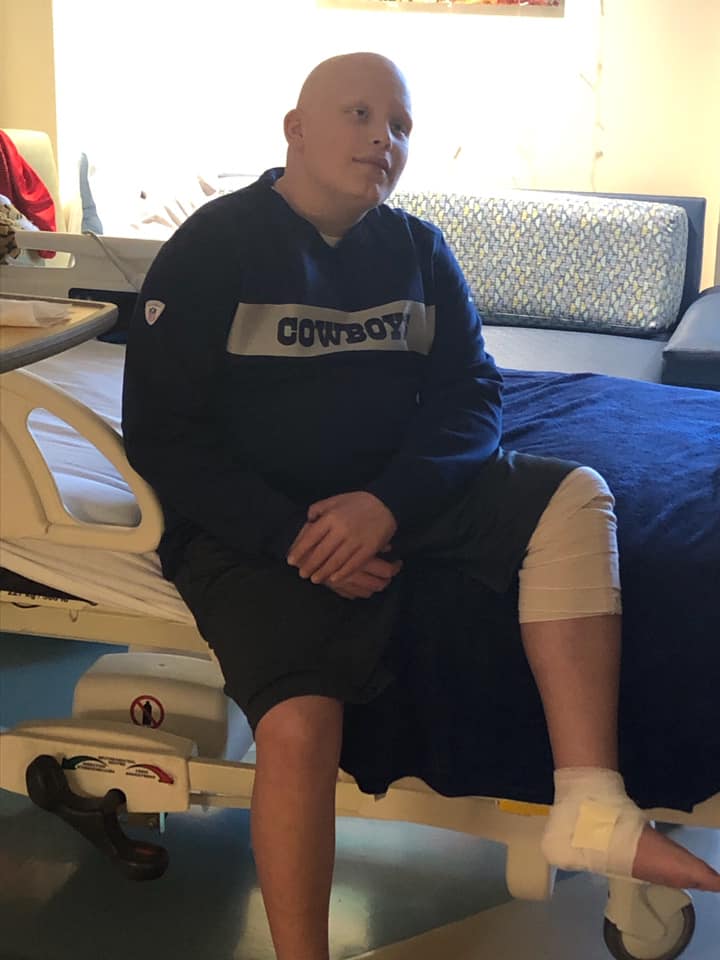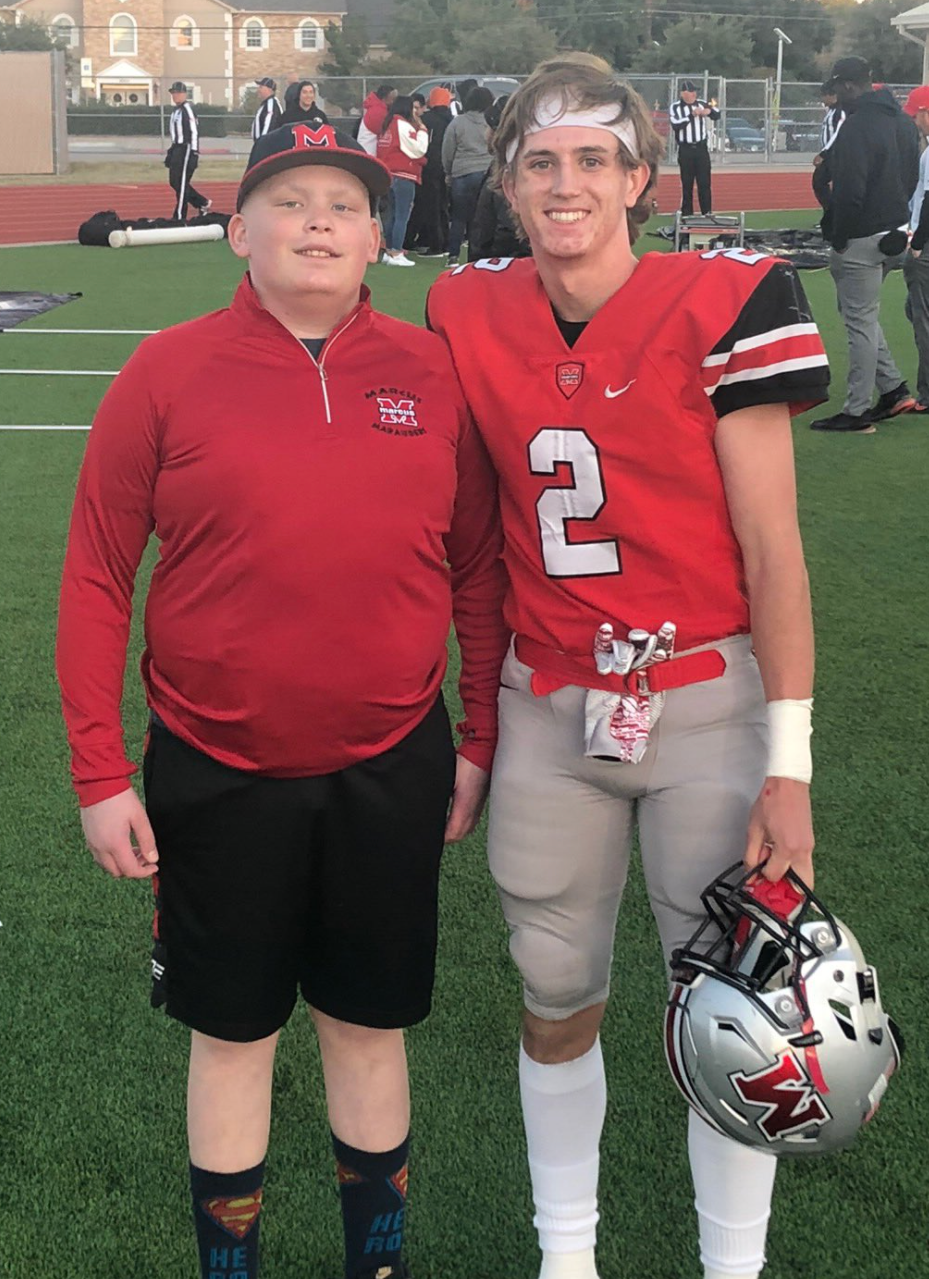Rounds of chemo
December 17, 2020

Chris’ treatment proved to be anything but easy. The disease was advanced, so he immediately began his first round of chemotherapy. Since Chris was severely immunocompromised, he couldn’t leave the ultra-filtered air of the hospital’s sixth floor. His family’s whole world was suddenly put on pause and confined to Children’s Medical Center Dallas.
“All the nurses, they became like family, and we would decorate how we wanted and we would joke that it was like our dorm room and they were our dorm mates,” Jennifer said. “But you never expect that you’re going to have two homes when your family is still together.”
On top of dealing with Chris’ diagnosis, his parents had to figure out everything from work to child care and grocery shopping. Jennifer said she felt like a robot, focusing on the seemingly endless tasks that came with having a sick kid.
“Those things just flood your mind,” Jennifer said. “How you’re going to deal with your day-to-day life when you realize that actually your day-to-day life was going to completely stop and change.”
Chris’ first round of chemotherapy left him extremely sick and in the hospital for 42 days. Although Chris doesn’t remember much of it, Jennifer does. His parents switched off staying with him in the hospital, but Jennifer often stayed when he was really sick.
Chris fought through everything from rashes to high fevers. He began losing his hair within his first two weeks in the hospital. It was the first time they realized how sick Chris truly was.
“It’s just hard,” Jennifer said. “We can’t do anything. You just have to sit there and watch and wait.”
There were multiple instances where they worried he might not make it through treatment.
“You get so bonded with your kid, and you never think that that moment would happen where you’re getting close to losing them,” Jennifer said. “It’s just an indescribable, terrifying feeling.”
Although Chris tried to be positive, it was impossible to ignore the fear that came with being sick. He wasn’t sure if he would make it to 14.
“He even told me that he doesn’t think he was supposed to see this birthday,” Jennifer said. “He obviously thought about it too even though he never expressed it.”
However, Chris’ health began to improve as the chemo worked against the cancer in his body. His doctors planned on three more treatments. Each would round last about a month, allowing Chris to go home for five to 10 days in between. They knew that the first round is normally the worst, so they began to feel more confident that Chris would beat leukemia.
• • •
On good days Chris and his mom did everything they could to have fun. They decorated their room and binged watched shows like “The Office.” They learned how to make nachos and smoothies in the hospital.
When he wasn’t doing schoolwork, Chris often hung out at the nurses’ station or rolled around the hallways in a wheelchair with a 3-year-old leukemia patient, who was the same age as his little brother, Harper. Chris treated her like a sibling, getting her candy and playing with her like he did with his brother before he was diagnosed.
His dad and little brother visited almost every night, often pushing tables together in the waiting room to have dinner. If not, they FaceTimed together to read stories and look at the decorations in Chris’ room. His little brother was too young to understand what was going on at the time, so Chris often tried to protect him from the reality of his cancer.
“He thought I was in a hotel at first,” Chris said. “The first night he stayed the night with me, he didn’t have a clue what was going on and so I tried not to let him see that I was actually sick.”
Spending so much time locked in a hospital room with his mom caused tension at times, which Jennifer expected. Chris was a teenager and he wanted to live like one. He wanted to see his friends and go to school. When the mental struggle of battling leukemia was added to feeling sick, nobody could expect Chris to be positive all the time.
“He had to learn how to be a new teenager, going through life changes, and living in the same room with your mom 24/7, because he didn’t always feel bad,” Jennifer said. “He had moments of being completely normal, but he was trapped and he couldn’t do anything about it.”
Although they butted heads sometimes, Chris said that having his mom with him when he was sick was comforting and strengthened their relationship.
“We’re used to being with each other all the time, so it’s kind of weird when we’re not,” Chris said. “It used to be weird going on road trips and stuff, but this season I had a tournament in Houston and we just drove down and talked for six hours. It didn’t bother me.”
• • •
But when Chris felt really sick, baseball was the one thing that could take his mind off of it. He loved to play catch whenever possible. When he didn’t feel well, his nurses talked to him about what it would be like to play again.
“Without that, I don’t know what would have kept him going,” Jennifer said. “That definitely was a major driving force.”
Chris met several professional athletes, but Jennifer said that the most influential players that reached out to Chris during his treatments were members of the varsity baseball team. They sent him a video message and card after hearing he was a baseball fan. Head Baseball Coach Jeffrey Sherman said that he always encourages his players to help people who may be facing difficult situations.

“I wanted a kid that’s around that’s just like us and to try to create some normalcy as he’s going through chemo, the game that he loves, and that our guys to be one inspired by,” Sherman said. “We’ve had some really good baseball teams and a lot of that has to do with people like Chris Noe and learning through his courage and his fight.”
The team has sponsored several kids with different medical conditions in the past, which motivated senior Ty Johnson to get Chris more involved with the team.
“I just wanted to create that for somebody else,” Johnson said. “Create that kind of happiness and give them somewhere where they belong.”
Chris became the team manager and went to every workout and game he could in between treatments. He quickly bonded with the players and encouraged them from the dugout.
“I’d go to some of the 5 a.m. workouts with them in the gym, so it definitely helped me motivate more,” Chris said.
Johnson and the rest of the team were inspired by the eighth grade boy who was determined to play baseball despite his illness.
“Seeing him putting a smile on his face kind of made my day and I’m pretty sure it made everybody else’s day too,” Johnson said.
• • •
But when he reached the end of his fourth round of chemo, which was supposed to be his last, his doctor decided to add one more to be safe. He would have to spend a few more weeks looking outside of his hospital window instead of getting back on the baseball field.
Chris was devastated.
“That brought on a lot of extra anxiety and fears and frustrations because we were actually just celebrating being done with the chemo,” Jennifer said.
During the fifth round of chemo, Chris got an infection. It caused his health to deteriorate quickly. He didn’t want to eat or move. His heart rate and respiration decreased, landing him on the ICU watchlist.
“It was definitely worse than I thought it was going to be,” Chris said. “It felt worse than chemo at some points.”